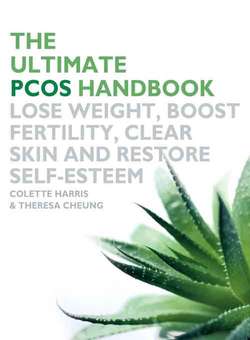Читать книгу The Ultimate PCOS Handbook: Lose weight, boost fertility, clear skin and restore self-esteem - Theresa Cheung - Страница 9
CAN GUYS HAVE PCOS?
ОглавлениеSome researchers believe that the PCOS gene can be passed down in men as well as women. Obviously it’s harder to diagnose in men, because they don’t have ovaries and don’t have periods, and what would be considered hirsutism (excess hair) in women would be considered normal hair distribution in men. Still, a number of different findings have suggested a pattern of symptoms which, if found together, may represent the male counterpart of PCOS:
Increased number of hair follicles
Low sperm count
Premature balding
Insulin resistance
Weight gain in the stomach area
Increased risk of diabetes and heart disease.
All this is currently speculative, but the signs that link some aspects of PCOS to male relations2 of women with PCOS adds weight not only to the pattern of inheritance theory but also to the ongoing argument against the appropriateness of the current name for the broad spectrum of symptoms associated with PCOS.
PCOS also seems to be more common among women from southern Asia than in white Caucasian women, but no one yet knows why.
Researchers are currently using gene technology to try and discover if any specific genes trigger PCOS. They need several hundred families to take part and the process can take decades. So far, studies that have concentrated on genes controlling oestrogen and progesterone have found no genetic link. But an interesting 1997 study3 showed that in PCOS a faulty gene may be involved in the first stage of testosterone production, and could account for the raised levels of this hormone often seen in women with PCOS. It’s possible that this gene may interact with other genes and with the environment to produce PCOS. Another study4 revealed that there may be a link between a specific variation in the insulin gene and the failure to ovulate in women with PCOS.
Other research suggests that PCOS may represent the final outcome of different, deeply inter-related genetic abnormalities and environmental factors that influence each other and perpetuate the syndrome.5 Most women dealing with the condition believe this to be true. We all know that if we’re stressed or put on weight or don’t exercise, it affects our symptoms.
Research into the genetics of PCOS continues – but what’s in it for us? If we can discover what genes trigger the syndrome, medical companies hope to develop medicines based on this knowledge, and perhaps even tests that can show very early on in life whether a person has PCOS or not, so you could create a diet and lifestyle to combat the problem, right from the start.
‘The biochemistry of PCOS is fascinating – but even more gripping is the realization that here is a genetic condition where, although there is no cure, sufferers can control the outcome through diet and lifestyle,’ says Dr Adam Carey, reproductive endocrinologist and nutritionist. ‘It is a condition where women really can use their environment to interact with their genetic programming and create a positive outcome.’
